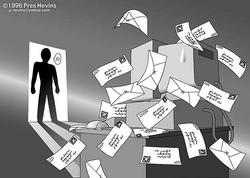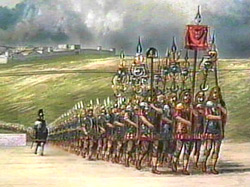| Wednesday, February 12, 2003 |
| My E-Mail Wish List |
 My e-mail program is a constant element of annoyance in my life, because it doesn't do the things I'd need it to do, and I get way too much mail for it to work right. It is Eudora 5.2, which is a fine e-mail program as it goes, but I need a whole other level of functionality. These are things I need: My e-mail program is a constant element of annoyance in my life, because it doesn't do the things I'd need it to do, and I get way too much mail for it to work right. It is Eudora 5.2, which is a fine e-mail program as it goes, but I need a whole other level of functionality. These are things I need:
- I need to keep track of my correspondence with different people. It should be easy to immediately see all prior incoming and outgoing messages in chronological order between me and a certain other person. - I shouldn't have to create special mailboxes and filters to do that. - Some people have several e-mail addresses, and I might have several e-mail addresses. I still want to be able to see my conversations with one person in one place, no matter what address we used, and no matter how we spelled our name that day. - When I get a message, my e-mail program should know whether this is somebody I know or not. Certainly it should know right away whether it is somebody I've ever exchanged e-mails with, and it should tell me somehow. - It should preferably also know if it is a known member of some group I'm in. There are 7000 people in the NCN directory. I'd like my e-mail program to recognize one of those people if they write to me, even if we didn't exchange e-mail before. - I'd like my e-mail program to have a reasonable assurance that an e-mail really is from the person it says it is. The SMTP protocol allows anybody to enter whatever they like as sender, so I need some kind of ID mechanism built in here. - I need SPAM recognition that I can train, like Apple's Mail program. I don't want centralized anti-SPAM blacklists, because they work badly and block things that shouldn't be blocked. - Any message that isn't from somebody I probably know, and that doesn't have proper digital ID, should go into a totally different place than messages that are from real people. - I need to be able to put a given message into any number of folders at the same time, without creating several copies. I need more dimensions. I want to always remember that a certain message was sent or received, so in principle it shouldn't actually leave my outbox or inbox, but at the same time I might want to file it under several different subjects, and give it various flags, and find it according to any of those keys. - I want statistics. How many messages do I get per day, how many did I answer, how many did I send, etc. None of those things are overly hard. Hardest part is probably the digital ID. The rest I could probably program myself, if I had a few weeks with nothing else to do, which isn't very likely. I need similar things for my Instant Messager programs. Actually I want continuity in my conversations across several different applications and platforms. Has anybody solved these things well in a program I don't know about? [ Technology | 2003-02-12 18:01 | 0 comments | PermaLink ] |
| The Blogs of Revolution |
 Peter Kaminski on Greater Democracy: Peter Kaminski on Greater Democracy:"Do you think government could be run better? [ Information | 2003-02-12 21:04 | 1 comment | PermaLink ] More > |
| The Age of Connection |
 Mitch Ratcliffe: Mitch Ratcliffe:"Individuals need to rise up and sieze the power they have always had and been urged to forget. Beyond voting, we need to organize and actively debate everything, from the sidewalks in our home towns to the bills before Congress and the ad hoc rulings from the executive branch. We need a parallel government that forces the attention of politicians back to the people and away from the monied interests. [ Organization | 2003-02-12 21:13 | 0 comments | PermaLink ] |
| Old Europe - or old America |
 Nice article by Graham E. Fuller. Nice article by Graham E. Fuller."Think about it. France and Germany have put five centuries of wars behind them, including two devastating world wars, to form a new union with shared currency and desires to forge a broad common foreign policy. Such a step is revolutionary among ancient nation-state rivals with different cultures.Good points. Europe is moving towards more consensus, collaboration, democracy, human rights and civil liberties. The United States is currently moving towards domination through force and intimidation, and the opposite of democracy, etc. [ Politics | 2003-02-12 23:59 | 1 comment | PermaLink ] More > |
| Monsanto Meltdown |
 The possibly most despised corporation in the world is finally hitting on some hard times. The possibly most despised corporation in the world is finally hitting on some hard times."Despite heavy advertising and PR greenwash, despite a cozy relationship with the White House, Monsanto's image, profits, and credibility have plunged. Its aggressive bullying on Frankenfoods, its patents on the Terminator gene, its attempt to buy out seed companies and monopolize seed stocks, and its persecution of hundreds of North American farmers for the "crime" of seed-saving, has made Monsanto one of the most hated corporations on Earth.Hopefully in very small pieces. I think that is good news for the environment. [ News | 2003-02-12 23:59 | 4 comments | PermaLink ] More > |
| Emergent democracy happening. |
Seb Paquet:"Took part in a thought-provoking phone conference this evening with Joi Ito, Clay Shirky, Ross Mayfield, Peter Kaminski, Liz Lawley, and Gen Kanai. We talked about emergence in weblogs (is there any? how do we see it?) and its possible impact on democratic processes (could it happen? how?). We plan to follow up on this, with other phone conferences (ask Joi if you want to join us) and complements such as the Emergent Democracy channel."Hey, don't leave me out, I'll be there. [ Organization | 2003-02-12 23:59 | 0 comments | PermaLink ] |